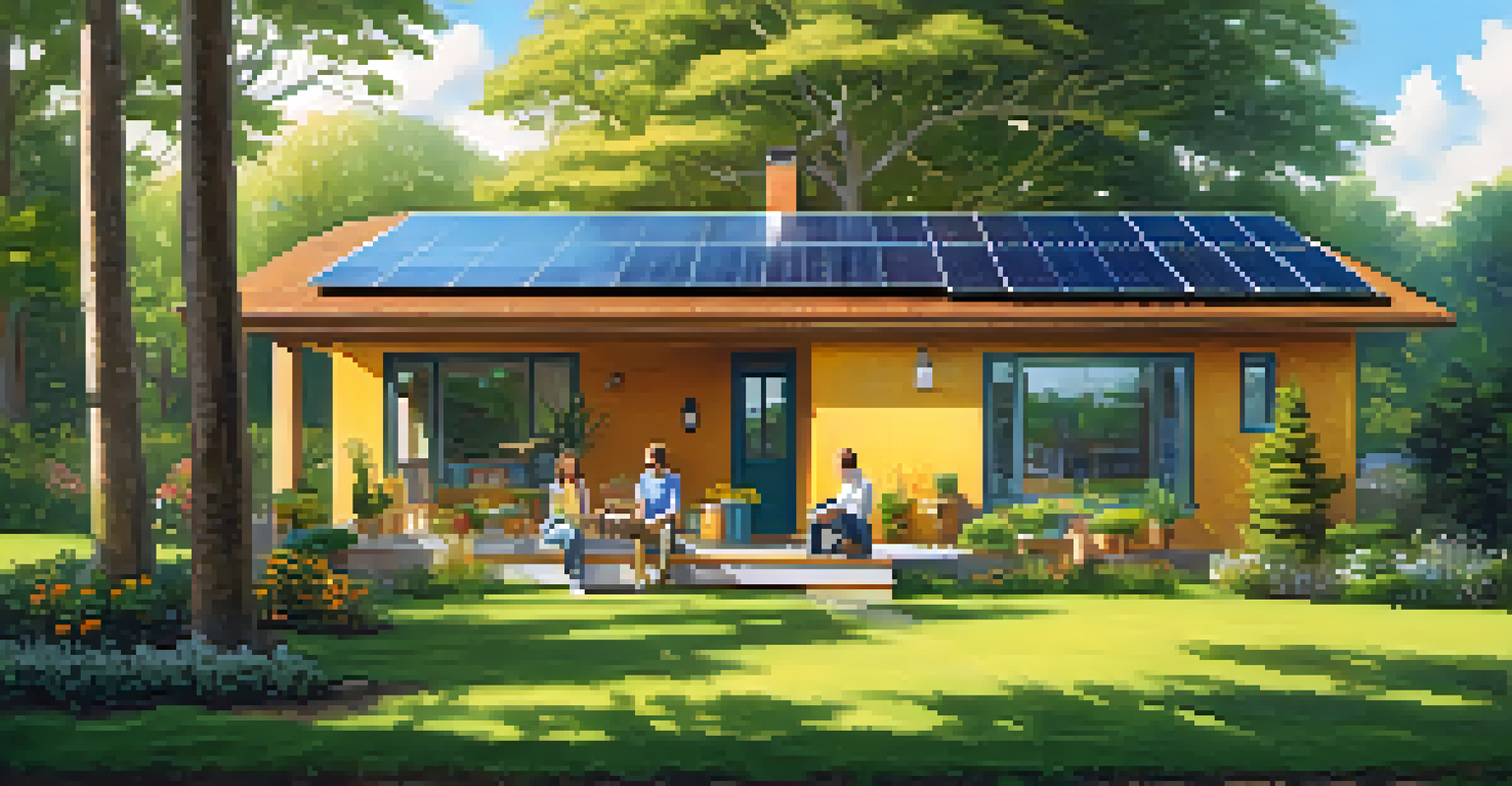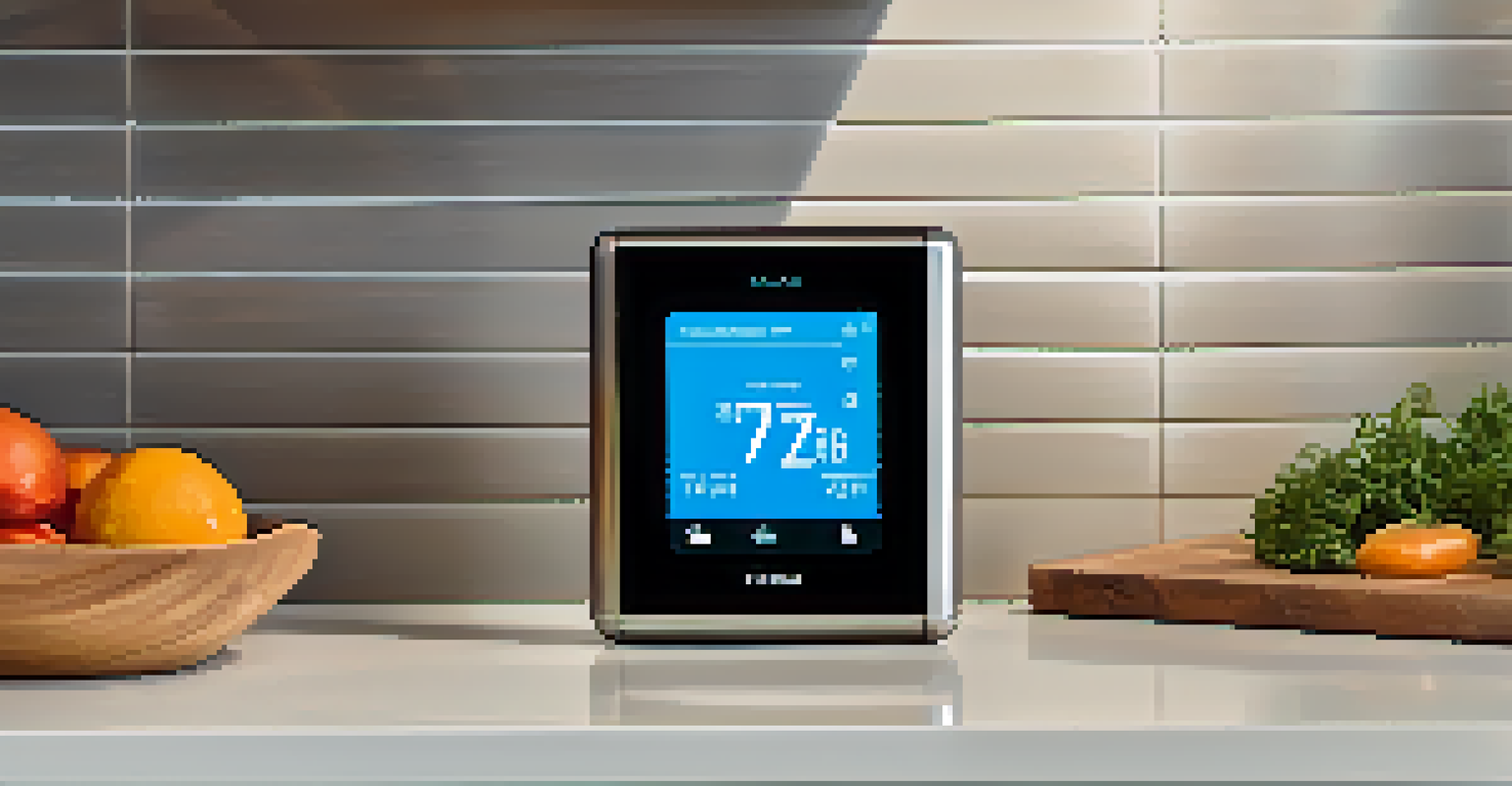Smart Home Energy Management: An Essential Upgrade

Understanding Smart Home Energy Management Systems
Smart home energy management systems (SHEMS) are innovative solutions that help homeowners optimize their energy usage. By integrating various smart devices, these systems provide real-time insights into energy consumption, allowing users to make informed decisions. Imagine having a personal energy advisor that tracks your habits and suggests ways to save money—this is the essence of SHEMS.
The greatest threat to our planet is the belief that someone else will save it.
These systems often include smart thermostats, energy-efficient appliances, and smart meters that monitor usage patterns. For instance, if you leave a light on in an unoccupied room, a SHEMS can alert you to turn it off, helping you avoid unnecessary costs. This proactive approach not only saves money but also contributes to environmental sustainability.
Incorporating SHEMS into your home can be a game-changer, as it enhances your control over energy consumption. With features like remote access via smartphone apps, you can adjust settings even when you're not home. This level of convenience is just one of the many benefits that come with embracing smart home technology.
The Financial Benefits of Smart Energy Management
One of the most compelling reasons to invest in smart home energy management is the potential for significant savings on utility bills. By optimizing energy use, homeowners can reduce their monthly expenses and even lower their carbon footprint. For example, smart thermostats can learn your schedule and adjust heating and cooling accordingly, ensuring energy isn't wasted when you're not at home.

Moreover, many utility companies offer incentives or rebates for installing energy-efficient devices, further enhancing the financial advantages. It’s like getting paid to save money—who wouldn’t want that? Over time, the initial investment in smart technology can lead to substantial long-term savings.
Save Money with Smart Energy Systems
Smart home energy management systems help homeowners reduce utility bills by optimizing energy use through smart devices.
Additionally, as energy prices continue to rise, the importance of effective energy management becomes even more critical. By adopting smart solutions, you’re not just saving today; you’re preparing for a more stable financial future. This proactive approach can make your home more resilient to fluctuating energy costs.
Enhancing Home Comfort with Smart Technology
Smart home energy management isn't just about saving money; it's also about enhancing your overall comfort. With the ability to remotely control your home’s temperature and lighting, you can create an environment tailored to your preferences. Imagine arriving home to a perfectly warmed house after a long day—smart technology can make this a reality.
Energy efficiency is not just a cost-saving opportunity; it is a pathway to a more sustainable future.
Smart sensors can adjust your home’s settings based on real-time conditions, ensuring optimal comfort levels. For instance, if the sun is shining brightly in a room, smart blinds can automatically close to keep the space cool. This level of automation not only enhances comfort but also ensures that energy is used efficiently.
Furthermore, many smart home systems can be integrated with voice assistants, allowing you to control your environment with simple voice commands. This seamless integration enhances the user experience, making energy management feel effortless. In the end, smart energy management is about creating a harmonious living space that meets your needs.
Environmental Impact of Smart Energy Management
Adopting smart home energy management systems not only benefits your wallet but also has a positive impact on the environment. By reducing energy consumption, you contribute to lower greenhouse gas emissions, which is essential in the fight against climate change. Every small action counts, and by optimizing energy use, you're making a difference.
For example, smart home systems can help identify energy-hungry devices that may need upgrading or replacement. By replacing outdated appliances with energy-efficient models, you can further reduce your household's environmental footprint. This not only conserves energy but also promotes a culture of sustainability in your community.
Enhance Comfort and Convenience
These systems allow for remote control of home settings, creating a personalized and comfortable living environment.
Moreover, as more homeowners adopt smart technologies, the collective effect can lead to significant reductions in overall energy demand. This shift not only benefits the environment but also encourages utilities to invest in renewable energy sources. Embracing smart energy management is a step towards a more sustainable future for all.
Choosing the Right Smart Home Energy Management System
With various smart home energy management systems available, selecting the right one for your needs can be overwhelming. It's essential to consider factors such as compatibility with existing devices, user interface, and the features that matter most to you. For instance, if you prioritize convenience, look for systems that integrate well with voice assistants.
Additionally, take the time to read reviews and seek recommendations from trusted sources. Understanding others' experiences can provide valuable insights into the effectiveness and reliability of different systems. Remember, the best system is one that fits seamlessly into your lifestyle and addresses your specific energy management goals.
Lastly, consider the long-term support and updates that the company offers. A system that evolves with technology will ensure you stay ahead in energy management. Choosing wisely can lead to a smoother transition into the world of smart homes and help you maximize your investment.
Future Trends in Smart Home Energy Management
As technology continues to evolve, the future of smart home energy management looks promising. Innovations such as artificial intelligence (AI) and machine learning are set to revolutionize how homes manage energy. These systems will become even smarter, learning your habits and preferences to optimize energy use automatically.
Moreover, the integration of renewable energy sources, like solar panels, with smart home systems will gain traction. Homeowners can not only manage their energy consumption but also generate and store energy, further reducing reliance on traditional power grids. This shift not only empowers homeowners but also promotes energy independence.
Support Environmental Sustainability
By reducing energy consumption, smart home systems contribute to lower greenhouse gas emissions and foster a culture of sustainability.
In addition, upcoming regulations and incentives will likely encourage more people to adopt smart energy solutions. As awareness of climate change grows, governments and organizations will play a crucial role in supporting this transition. The future of home energy management is bright, and being a part of this movement is an opportunity to contribute to a more sustainable world.
Getting Started with Smart Home Energy Management
Embarking on your smart home energy management journey doesn’t have to be daunting. Start small by identifying areas where you can improve efficiency, such as upgrading to smart bulbs or a programmable thermostat. These initial steps can lead to noticeable savings and set the stage for more advanced systems.
Next, evaluate your energy consumption patterns to understand where the most significant savings can occur. Many smart devices come with user-friendly apps that provide insights into your usage, making it easier to track progress. By setting goals and monitoring your energy use, you'll gain a clearer picture of your consumption habits.

Lastly, consider seeking professional help for more complex installations. A knowledgeable technician can guide you through the setup process and ensure that your system operates optimally. Taking these steps will not only enhance your home’s efficiency but also empower you to make informed decisions for a sustainable future.